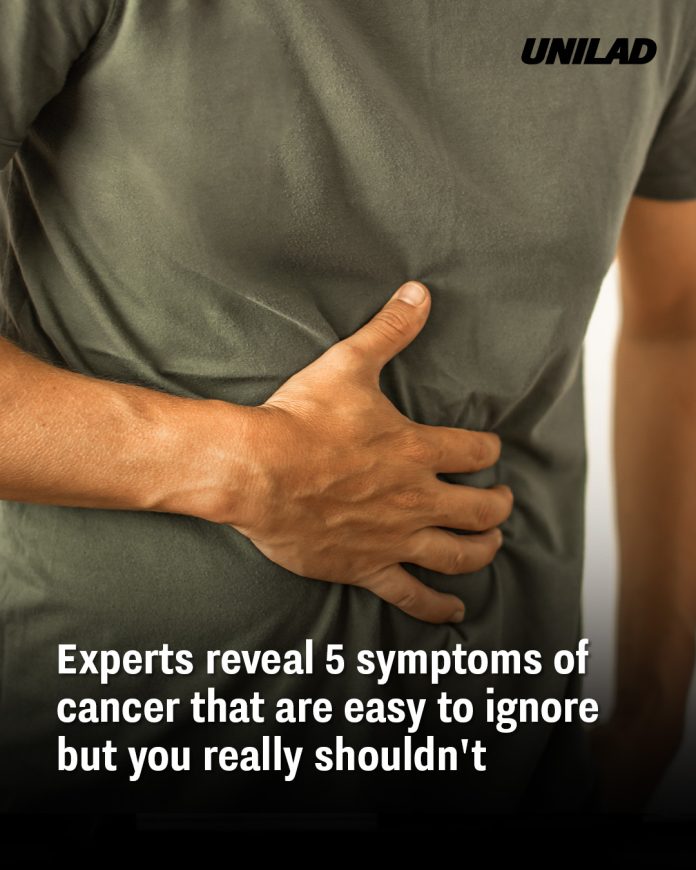Are you ignoring these symptoms? You shouldn’t, because they could be a sing of cancer. Cancer is a disease that often develops quietly, giving subtle signals long before it becomes advanced. Many people dismiss these early signs as ordinary discomforts or everyday health issues. However, experts stress that recognizing and addressing them early can make a life-saving difference. Below are five symptoms that might seem easy to overlook but should never be ignored.
1. Shortness of Breath
It is normal to feel winded after intense exercise, but unexplained breathlessness during simple daily activities can be a warning sign. Struggling to climb stairs, becoming unusually tired while carrying groceries, or gasping for air during light activity may indicate that something more serious is happening inside the body. This change should prompt medical evaluation, as certain cancers can affect lung function, blood circulation, or even cause fluid buildup that impacts breathing.

2. Unexplained Bleeding
Bleeding is often associated with minor injuries, but when it happens without a clear cause, it becomes a red flag. Examples include coughing up blood, blood in the stool, passing blood in the urine, unusual vaginal bleeding, or discharge from the nipple. While not every instance of bleeding points to cancer, such signs can sometimes be linked to cancers of the digestive system, urinary tract, or reproductive organs. Doctors emphasize that unexplained bleeding always requires professional attention to rule out serious conditions.
3. Lumps and Masses
Finding a lump on the body can be alarming, yet many people hope it will simply disappear. While some lumps are harmless, like swollen lymph nodes from a cold, persistent or unusual growths need investigation. A mass that feels hard, grows over time, or remains despite treatment could indicate cancer. Detecting such changes early is vital because cancers such as breast, testicular, or lymphatic cancers often begin as small, painless lumps.
4. Difficulty Swallowing and Bloating
Another warning sign involves the digestive system. If food starts to feel like it gets stuck when swallowing, or if swallowing becomes painful, it may indicate conditions like oesophageal cancer. Similarly, persistent bloating or feeling full after eating only a small amount can point to abdominal or ovarian cancers. Occasional indigestion is common, but repeated problems with swallowing or long-term bloating deserve medical attention.
5. Changes in Bodily Functions
The body has natural rhythms, and when these suddenly change, it can signal trouble. Persistent constipation, ongoing diarrhoea, or noticeable changes in urination should not be ignored. Some people experience the feeling of incomplete bowel movements, difficulty passing stool, or even passing air in urine. While these symptoms can result from less serious conditions, their persistence is concerning. Paying attention to such changes can help doctors detect colon, bladder, or prostate cancers at earlier stages.

Why Early Detection Matters
It is important to understand that these symptoms do not always mean cancer. They may be caused by other health issues, ranging from infections to benign growths. However, the risk of ignoring them is far greater than the inconvenience of seeking medical advice. Cancer that is caught early is far more treatable, often requiring less aggressive therapy and offering better chances of survival.
Taking Responsibility for Your Health
Our bodies often give subtle warnings when something is wrong. By listening carefully and seeking medical help when changes occur, people can protect themselves from more serious outcomes. Early medical consultation, routine check-ups, and honest conversations with healthcare professionals are crucial.
In summary, shortness of breath, unexplained bleeding, unusual lumps, difficulty swallowing or bloating, and changes in bodily functions may all appear minor at first glance. Yet these signs could represent the body’s early alarm system against cancer. Ignoring them allows disease to progress silently. Paying attention and acting promptly could ultimately save your life.

















